Related Research Articles

Churches Uniting in Christ (CUIC) is an ecumenical organization that brings together mainline American denominations, and was inaugurated on January 20, 2002, in Memphis, Tennessee on the balcony of the Lorraine Motel. It is the successor organization to the Consultation on Church Union.
Full communion is a communion or relationship of full agreement among different Christian denominations or Christian individuals that share certain essential principles of Christian theology. Views vary among denominations on exactly what constitutes full communion, but typically when two or more denominations are in full communion it enables services and celebrations, such as the Eucharist, to be shared among congregants or clergy of any of them with the full approval of each.
The African Union Methodist Protestant Church (AUMPC), abbreviated as A.U.M.P. Church, is a Methodist denomination. It was chartered by Peter Spencer (1782–1843) in Wilmington, Delaware, in 1813 as the "Union Church of Africans", where it became known as the "African Union Church".
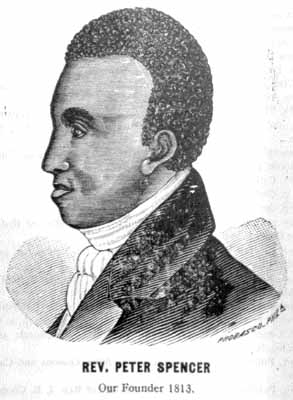
Peter Spencer (1782–1843) was an American freedman who in 1813 founded the Union Church of Africans in Wilmington, Delaware. The denomination is now known as the African Union First Colored Methodist Protestant Church and Connection, or A.U.M.P. Church for short. Born into slavery in 1782 in Kent County, Maryland, Spencer was freed after his master died, by the terms of his will.
The Methodist Episcopal Church (MEC) was the oldest and largest Methodist denomination in the United States from its founding in 1784 until 1939. It was also the first religious denomination in the US to organize itself nationally. In 1939, the MEC reunited with two breakaway Methodist denominations to form the Methodist Church. In 1968, the Methodist Church merged with the Evangelical United Brethren Church to form the United Methodist Church.
The Methodist Episcopal Church, South was the American Methodist denomination resulting from the 19th-century split over the issue of slavery in the Methodist Episcopal Church (MEC). Disagreement on this issue had been increasing in strength for decades between churches of the Northern and Southern United States; in 1845 it resulted in a schism at the General Conference of the MEC held in Louisville, Kentucky.
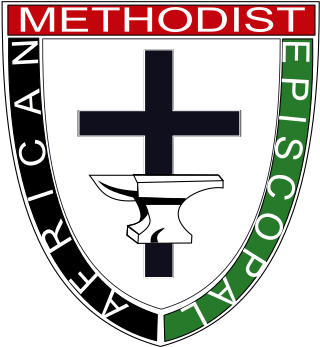
The African Methodist Episcopal Church, usually called the AME Church or AME, is a Methodist denomination based in the United States. It adheres to Wesleyan–Arminian theology and has a connexional polity. It cooperates with other Methodist bodies through the World Methodist Council and Wesleyan Holiness Connection.

The Christian Methodist Episcopal Church (C.M.E.C.) is a Methodist denomination that is based in the United States. It adheres to Wesleyan-Arminian theology. Though historically a part of the black church, the Christian Methodist Episcopal church membership has evolved to include all racial backgrounds.

The African Methodist Episcopal Zion Church, or the AME Zion Church (AMEZ) is a historically African-American Christian denomination based in the United States. It was officially formed in 1821 in New York City, but operated for a number of years before then. The African Methodist Episcopal Zion Church adheres to Wesleyan-Arminian theology.
The Ethiopian movement is a religious movement that began in southern Africa towards the end of the 19th and early 20th century, when two groups broke away from the Anglican and Methodist churches. One of the main reasons for breaking away was the growing idea that Africa had little to no history before the European colonisation of the continent, leaving many Africans upset at the prospect of their heritage and culture being erased through colonialism.
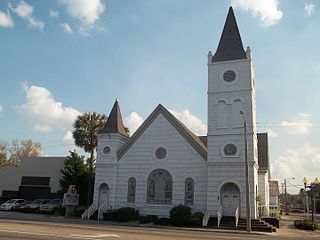
The Black church is the faith and body of Christian denominations and congregations in the United States that predominantly minister to, and are also led by African Americans, as well as these churches' collective traditions and members.

Daniel Alexander Payne was an American bishop, educator, college administrator and author. A major shaper of the African Methodist Episcopal Church (AME), Payne stressed education and preparation of ministers and introduced more order in the church, becoming its sixth bishop and serving for more than four decades (1852–1893) as well as becoming one of the founders of Wilberforce University in Ohio in 1856. In 1863, the AME Church bought the college and chose Payne to lead it; he became the first African-American president of a college in the United States and served in that position until 1877.

Religion of Black Americans refers to the religious and spiritual practices of African Americans. Historians generally agree that the religious life of Black Americans "forms the foundation of their community life". Before 1775 there was scattered evidence of organized religion among Black people in the Thirteen Colonies. The Methodist and Baptist churches became much more active in the 1780s. Their growth was quite rapid for the next 150 years, until their membership included the majority of Black Americans.
Black Methodism in the United States is the Methodist tradition within the Black Church, largely consisting of congregations in the African Methodist Episcopal (AME), African Methodist Episcopal Zion, Christian Methodist Episcopal denominations, as well as those African American congregations in other Methodist denominations, such as the Free Methodist Church.

Henry McNeal Turner was an American minister, politician, and the 12th elected and consecrated bishop of the African Methodist Episcopal Church (AME). After the American Civil War, he worked to establish new A.M.E. congregations among African Americans in Georgia. Born free in South Carolina, Turner learned to read and write and became a Methodist preacher. He joined the AME Church in St. Louis, Missouri, in 1858, where he became a minister. Founded by free blacks in Philadelphia, Pennsylvania, in the early 19th century, the A.M.E. Church was the first independent black denomination in the United States. Later Turner had pastorates in Baltimore, Maryland, and Washington, DC.
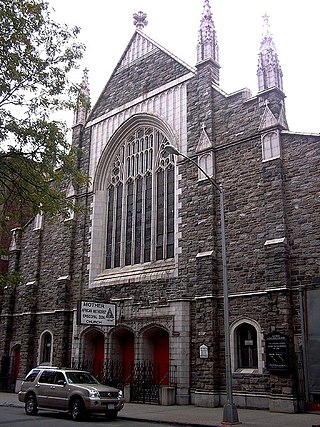
The Mother African Methodist Episcopal Zion Church, also known as "Mother Zion", located at 140–148 West 137th Street between Adam Clayton Powell Jr. Boulevard and Lenox Avenue in the Harlem neighborhood of Manhattan, New York City, is the oldest African-American church in New York City, and the "mother church" of the African Methodist Episcopal Zion conference.
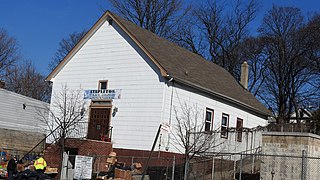
The Union American Methodist Episcopal Church (UAMEC), which is abbreviated as the U.A.M.E. Church, is a Methodist denomination of Christianity.

The history of Methodism in the United States dates back to the mid-18th century with the ministries of early Methodist preachers such as Laurence Coughlan and Robert Strawbridge. Following the American Revolution most of the Anglican clergy who had been in America came back to England. John Wesley, the founder of Methodism, sent Thomas Coke to America where he and Francis Asbury founded the Methodist Episcopal Church, which was to later establish itself as the largest denomination in America during the 19th century.

Bishop Singleton T. Jones was a religious leader in the African Methodist Episcopal Zion Church. Although he had little education, Jones taught himself to be an articulate orator and was awarded the position of bishop within the church. Besides being a pastor to churches, he also edited AME Zion publications, the Zion's Standard and Weekly Review and the Discipline.
References
- ↑ Dalleo, Peter T. (June 27, 1997). "The Growth of Delaware's Antebellum Free African Community". University of Delaware.
- ↑ Russell, A.U.M.P. Church history, 1920, Documenting the American South, University of North Carolina
- 1 2 3 Banks, Adelle M. (7 May 2012). "Methodists Reach Across Historic Racial Boundaries with Communion Pact". Christianity Today . Retrieved 11 November 2012. (access url updated 16 June 2016)